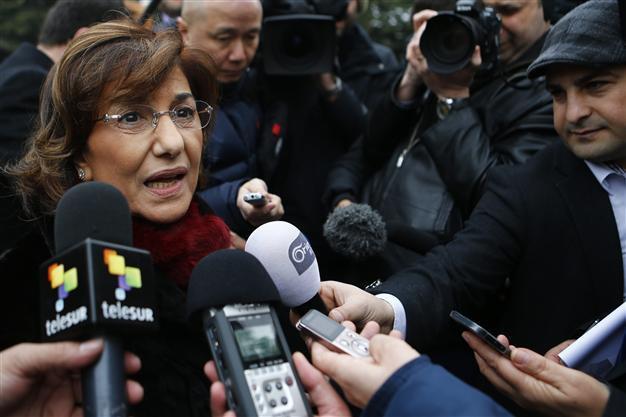Syria talks set to end with no concrete progress
GENEVA - Agence France-Presse

Bouthaina Shaaban, advisor to Syrian President Bashar al-Assad, speaks to the media after a meeting at the Geneva Conference on Syria at the United Nations European headquarters in Geneva Jan 30. REUTERS photo
Syria's warring sides are expected to wrap up their first peace talks on Jan. 31 without concrete progress on ending the violence, a political transition or ensuring humanitarian aid for millions in need.
The Syrian regime and the opposition representatives got bogged down in a dispute on Jan. 30 over who was responsible for the violence in the country, as the peace talks in Geneva focused on "terrorism."
While the mere fact of the rivals agreeing on a topic of discussion was seen as a step forward, the first round of talks are expected to end Jan. 31 without any significant breakthrough.
"There is of course agreement that terrorism ... is a very serious problem inside Syria, but there's no agreement on how to deal with it," U.N. mediator Lakhdar Brahimi told reporters, ahead of the seventh and final day of talks.
The two sides have been brought together in Geneva in the biggest diplomatic push yet to end a civil war that has left more than 130,000 dead and forced millions from their homes.
"This is really the beginning of our process," Brahimi stressed. "I hope that when we come back we'll have a more structured discussion," said the U.N. mediator, who on Jan. 31 is expected to announce a second round of talks in Geneva after about a week.
During the interval, Syrian opposition chief Ahmad Jarba will visit officials in Russia, one of the Syrian regime's staunchest allies, his top aide told AFP Jan. 30 evening.
Just getting the warring sides to sit down together for the first time since the conflict erupted in March 2011 is, however, seen as an important step forward.
"The important thing is that the parties meet in the same room," U.N. Secretary General Ban Ki-moon told reporters in Berlin Jan. 30.
Minute of silenceThe sixth day of talks got off to a positive start, with the two sides sharing a minute of silence for all victims of the Syrian tragedy.
But even that symbol of unity was shattered when both sides insisted they were the ones who had requested the gesture.
The regime delegation then went on to present a text it wanted the other side to agree on, urging all states to "prevent and stop the funding of terrorist acts." The text, obtained by AFP, also insisted that "fighting terrorist organisations and driving them out of Syria is a common objective and duty for every Syrian."
The opposition rejected the communiqué as "one-sided" and "unacceptable," delegation spokesman Louay Safi told reporters, pointing out that the text failed to denounce "the regime's crimes against humanity." He insisted it was useless to discuss how to rein in violence before setting up a transitional government, called for in the never-implemented roadmap to peace adopted in 2012, without President Bashar al-Assad. The current regime "wants to keep the head of the regime at the expense of destroying the whole country," he said.
The regime delegation has said al-Assad's position is not up for debate in Geneva.
Chemical warningMeanwhile, Washington expressed concern over Syria's delay in handing over such weapons, after the world's chemical watchdog said less than five percent of the most dangerous chemicals in the Syrian armoury had been shipped out.
"This is not rocket science here. They're dragging their feet," said State Department spokeswoman Jen Psaki.
"We need them to pick up those feet and run with this and move forward in moving the chemical weapons stockpile to the ports," she added.
